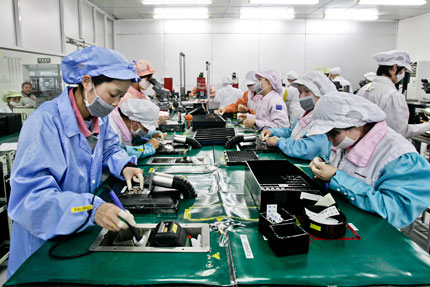When the migrants stay at home ...
|
|
|
Workers are busy at a Pioneer Electronics workshop in Shanghai's Fengxian District. The city is now facing a looming labor shortage. |
Jia Yongwan, 36, a migrant worker from southwest China, didn't join the millions traveling home last month for the traditional Spring Festival break. Instead, he chose to stay alone in Shanghai to see if he could find a better-paying job.
Jia, who supports his wife and children back home in Guizhou Province, said he wants a job paying 3,000 yuan (US$457) a month, but he hasn't found one.
The former welder in a Guangzhou factory said his monthly living expenses in Shanghai have risen to 1,500 yuan.
"I heard the salary in Shanghai might be higher," he said. "So I'm here."
Shanghai, a city that built its gleaming skyline and ran its beehive factories on the back of migrants, is now facing the alarming prospect that laborers from poorer areas of China are no longer flooding in to seek their fortunes, and those who do are getting choosy.
A looming labor shortage could have serious repercussions for a city still brimming with expansion plans. Shanghai wants to turn itself into a global financial hub, restructure its antiquated industries and plunge into advanced technological fields.
Somebody has to do the grunt work.
Hundreds of millions of rural laborers who once left hometowns and families to make money in Shanghai and other mega-cities along the eastern coast are now seeing a geographical shift in their prospects.
Central government initiatives aimed at steering economic development to poorer regions of China mean that many migrants can now find decent paying jobs much closer to their hometowns, where living costs aren't so high.
Indeed, some older, labor-intensive Shanghai companies that don't cut the muster under the city's new vision of itself are relocating to inland areas, where production costs are cheaper and government regulations not so high-handed.
At the same time, the cost of living in Shanghai and other east metropolises has soared much faster than salaries, leaving low-paid migrants in the lurch.
Chen Jiewei, a human resources manager with China International Intellectech Corp, said many migrant workers can find jobs in inland areas paying about the same as in Shanghai. "So why not work in a place nearer to home?" Chen said.
Many Shanghai companies are eager to expand just at a time when many migrants aren't returning to the city, he said. That is causing a "severe labor shortage that will last for a long period."
Zhao Jiande, director of the migrant worker office under the Shanghai Human Resources and Social Security Bureau, told Shanghai Daily that the labor pool in the city may fall 20 percent short of demand.
The shortage is especially acute in sectors such as restaurants, electronics manufacturing, clothing and industrial tools.
To address the shortfall, Shanghai officials are urging employers to increase salaries for the lowest-paid workers. At the city's government job placement centers, companies are advised to pay laborers, assembly-line workers and low-end service industry workers about 2,000 yuan a month, a 500 yuan increase from last year.
Shanghai's catering industry alone needs about 1 million workers, and at least 200,000 jobs are going begging, according to Zhao. Unskilled jobs such as working in restaurants don't pay much but require long hours, he said, so it's hard to keep workers. "The sector is always short of hands."
In addition, the city also badly needs more skilled workers.
An official in the white goods industry told Shanghai Daily that about 30 percent of jobs in the sector are vacant. Migrant workers with skills are hard to find.
China International Intellectech's Chen said the labor shortage mostly affects smaller businesses that can't afford higher salaries and benefits.
The shortfall hasn't hit big companies in any big way yet, he said.
If labor won't come to Shanghai, Shanghai will have to go to the labor.
 0
0 








Go to Forum >>0 Comments